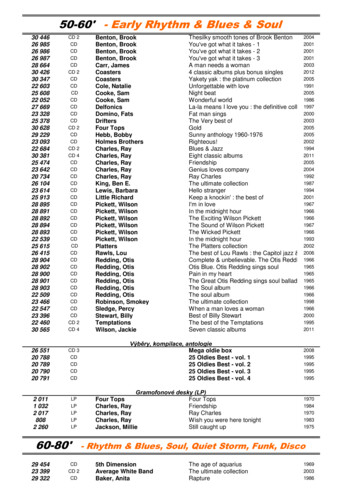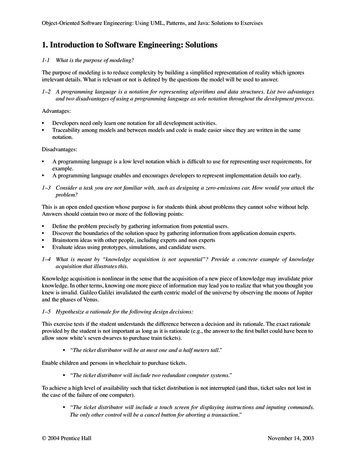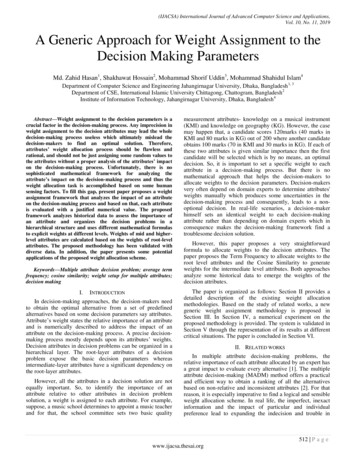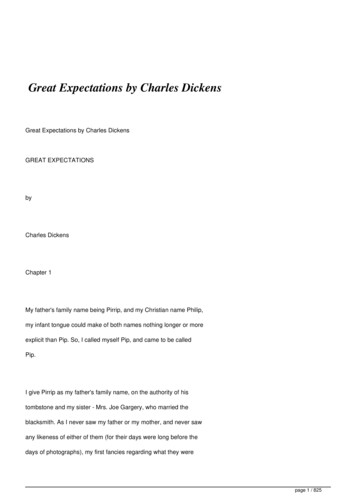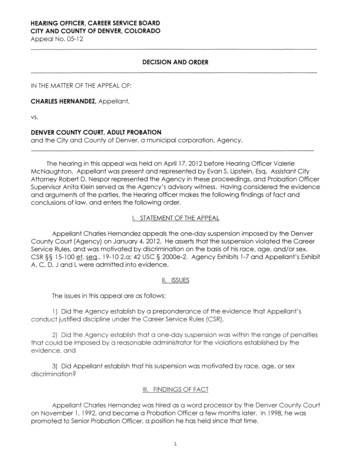
Transcription
HEARING OFFICER, CAREER SERVICE BOARDCITY AND COUNTY OF DENVER, COLORADOAppeal No. 05-12DECISION AND ORDERIN THE MATTER OF THE APPEAL OF:CHARLES HERNANDEZ, Appellant,vs.DENVER COUNTY COURT, ADULT PROBATIONand the City and County of Denver, a municipal corporation, Agency.The hearing in this appeal was held on April 17, 2012 before Hearing Officer ValerieMcNaughton. Appellant was present and represented by Evan S. Lipstein, Esq. Assistant CityAttorney Robert D. Nespor represented the Agency in these proceedings, and Probation OfficerSupervisor Anita Klein served as the Agency's advisory witness. Having considered the evidenceand arguments of the parties, the Hearing officer makes the following findings of fact andconclusions of law, and enters the following order.I. STATEMENT OF THE APPEALAppellant Charles Hernandez appeals the one-day suspension imposed by the DenverCounty Court (Agency) on January 4, 2012. He asserts that the suspension violated the CareerService Rules, and was motivated by discrimination on the basis of his race, age, and/or sex.CSR§§ 15-100 et. -, 19-10 2.a; 42 USC§ 2000e-2. Agency Exhibits 1-7 and Appellant's ExhibitA, C, D, J and L were admitted into evidence.II. ISSUESThe issues in this appeal are as follows:1) Did the Agency establish by a preponderance of the evidence that Appellant'sconduct justified discipline under the Career Service Rules (CSR),2) Did the Agency establish that a one-day suspension was within the range of penaltiesthat could be imposed by a reasonable administrator for the violations established by theevidence, and3) Did Appellant establish that his suspension was motivated by race, age, or sexdiscrimination?Ill. FINDINGS OF FACTAppellant Charles Hernandez was hired as a word processor by the Denver County Courton November l, 1992, and became a Probation Officer a few months later. In 1998, he waspromoted to Senior Probation Officer, a position he has held since that time.1
Senior Probation Officers manage pre-sentencing and probation cases assigned to theProbation Department by criminal courts in a variety of cases. Each officer carries an averageworkload of 240 cases. Their duties include interviewing, counseling, submitting reports andsentencing recommendations to judges, and supervising clients on probation. If not appearingpersonally, a probation officer must submit the report to the Personal Court Representative{PCR) assigned to the courtroom scheduled to hear the show cause hearings and probationrevocation matters. [Klein, Zaleski testimony.]Several years ago, the probation officers developed by consensus their own one-pageforms for their reports for show cause and probation revocation hearings. Appellant and othersgradually adapted those forms for their own use over time. [Appellant, DeRoehn.] In August2010, Probation Officer Anita Klein was promoted to supervisor, and instituted official forms foruse in those types of hearings. [Klein; Exhs. 5-1, 5-3.] Appellant and some other officerscontinued to use their own forms. [DeRoehn, Appellant; Exhs. 5-2, 5-4.]On Tuesday, October 25, 2011, Appellant submitted reports using his own forms to thePCR for eight cases set for the coming Thursday court dates. [Exhs. 5-2, 5-4.] At 10:31 thatmorning, Ms. Klein emailed all probation staff that they were all now required to use the officialform for court preparation. The email stated,The forms attached, for those of you who aren't using them, are the onesrequired for court preparation. Should you choose to use an alternative form, thePCR and/or sup will return those cases to you and have you re-do your prep. Iapologize that this note had to go out, ESP to folks who have been correctlydoing this. Any questions see me. Anita[Exhs. 4, 5-3.JAppellant responded in an email, asking "Can I delete the Denver and Probation sealson the top of the form? Those 2 entries use a lot of ink." Ms. Klein responded, "no." [Exh. 4-2.J Afew minutes later, Appellant asked, "And . ! already completed my cases for this week and theyhave been distributed. I will start using the new form next week if that is okay." Ms. Kleinresponded, "No, effective now. Thanks." [Exh. 4-1.] Appellant testified he was unaware untilthat email that use of Ms. Klein's form was mandatory. Since he had spent about 90 minutespreparing the forms the previous Friday, he believed re-doing them would be unnecessarilytime-consuming. As a result, Appellant added the defendant's name and some otherinformation to the standardized form, stapled it to the form he had previously completed, andresubmitted both. [Appellant, Klein; Exh. 5.] The form Appellant used called for much the samecontent as the standardized form, and the courtroom PCR had no difficulty understandingAppellant's recommendations from his forms and communicating them to the judge. [Lafore,DeRoehn, Appellant.]Pursuant to Ms. Klein's directive, the PCRs returned non-complying forms to the probationofficers so they could be re-issued on the official form. [Klein, DeRoehn.] Probation Officer LisaHanson asked Ms. Klein if the modified forms she had submitted were sufficient. Ms. Kleindirected her to use the official forms, and Ms. Hanson did so. The next day, Ms. Klein audited thecourt files prepared by her probation officers to monitor compliance with her directive. Shedetermined that all had complied with the exception of Appellant, who submitted both his ownform and the partially-completed official form. It is undisputed that Appellant thereafterconsistently complied with the directive. [Klein; Exh. J.]2
After completing the audit, Ms. Klein sought out Appellant to discuss the matter, butcould not find him. She then made copies of the forms he had submitted, and gave them toChief Probation Officer Chris Zaleski. Mr. Zaleski then requested assistance from HR ProfessionalSuzanne Razook to determine how to respond to Appellant's action. On November 2, 2011, Ms.Klein, Mr. Zaleski, and Ms. Razook met with Appellant to discuss the matter. On December 6,2011, the Agency sent Appellant a letter stating that discipline was being considered for hisfailure to use the new forms for court preparation. [Exh. 1] . After the December 20, 2011 predisciplinary meeting, Ms. Klein issued a one-day suspension based on her findings thatAppellant's action violated CSR§§ 16-60 A, J, and L, and that a one-day suspension wasappropriate based on the nature of the conduct and the fact that he had received a writtenreprimand in the previous month. [Exhs. 2, 7.]A week before the pre-disciplinary meeting, Mr. Zaleski held the regular monthly meetingfor all probation staff. He remarked that ten percent of the staff was demanding 80% of his time,and that in the future he would devote his time to the 90% that were "on the bus." Many at themeeting assumed he was referring to Appellant and Elias Molina, both of whom are Hispanicand were the subject of recent disciplinary proceedings. After the meeting, co-workers jokinglyreferred to Appellant as a "ten-percenter." [Appellant Molina, LaFore, DeRoehn.J Mr. Zaleskiconceded that his statements were allusions to the recent disciplinary matters involvingAppellant, Molina and Paula Gerbitz, who is married to a Hispanic.Mr. Zaleski became the Chief Probation Officer in March 2011, and shortly thereafter hada conflict with Appellant based on the latter's practice of closing his door during meetings withdefendants, contrary to Mr. Zaleski's policy. [Exh. A.] The Agency stipulated that Appellant is agood probation officer who earned "exceeds expectations" performance ratings for all but oneyear between 2000 and 2010. [Exh. L.] The November written reprimand was his first disciplinaryaction in his twenty years of employment. [Exh. 7.] Mr. Zaleski also disciplined Mr. Molina, aprobation officer who had served ten years without previous discipline, in the fall of 2011.[Molina.] Appellant contends that his suspension and previous negative treatment by Mr. Zaleski- including ten counseling sessions, a May office reassignment, a June memorandum ofexpectations, and the November written reprimand - were harassment and were motivated byhis race, sex and/or age. [Appellant; Exhs. 3, 6-5, 7, A. C.]IV. ANALYSISThe Agency bears the burden to prove by a preponderance of the evidence that theconduct stated in the disciplinary letter violates the Career Service Rules cited in the disciplinaryaction. The Agency must also establish that a one-day suspension is within the range ofdiscipline that can be imposed by a reasonable administrator based on the proven violationsand Appellant's employment and disciplinary histories. In re Gus tern, CSA 128-02, 20 ( 12/23/02);Turnerv. Rossmiller, 535 P.2d 751 (Colo. App. 1975). Appellant bears the burden to establish hisrace, age, and sex discrimination claims by a preponderance of the evidence. In re LombardHunt, CSA 75-07, 7 (3/3/08), citing St. Mary's Honor Center v. Hicks, 509 U.S. 502, 510--512 (U.S.1993).A. VIOLATION OF DISCIPLINARY RULES1. Neglect of duty under CSR § 16-60 AAn employee neglects his duty within the meaning of this rule when he fails to perform ajob duty he knows he is supposed to perform. In re Compos et al, CSA 56-08, 2 (CSB 5/21 /09).3
The Agency asserts that Appellant neglected his duty by failing to complete the officialprobation forms on October 25, as directed by his supervisor. Appellant does not deny that hereceived the email directing all officers to use the official forms. His subsequent actions indicatethat he understood the email as an order to use the official forms. When he told Ms. Klein thathe had already done the work on eight cases and asked permission to delay compliance untilthe following week, she reaffirmed that the order was effective immediately. In spite of thisexchange, Appellant chose to resubmit his old forms, stapled to the partially completed newforms. Exhibit 5 contains the two forms submitted in two of Appellant's eight cases. As a result,the PCR was then required to review two forms in all of Appellant's cases in order to representthe Departmenfs position in court that Thursday. [Lafore.] Appellant conceded that theoriginal work consumed only about ten minutes per case, or a total of 90 minutes.The duty at issue as to this allegation is use of the official court preparation forms tocommunicate sentencing recommendations, an important part of a probation officer's job.Appellant's resubmission of his forms attached to the official form containing only minimalinformation did not constitute performance of that clearly communicated duty. The Agencytherefore established that Appellant violated CSR § 16-60 A.2. Failure to comply with lawful orders under CSR§ 16-60 J.Violation of this rule is established by proof that a supervisor communicated a reasonableorder, and the subordinate violated that order under circumstances demonstrating willfulness.In re Sawyer and Sproul, CSA 33-08, 9 (1 /27 /09).The undisputed evidence showed that Appellant's supervisor ordered all probationofficers to use the official forms for all cases, effective immediately. Appellant did not do so, butchose instead to attach his forms to the approved forms, adding only the name of thedefendant and his unsupported recommendation. [Exh. 5.] He testified that he believed redoing the forms would have been too time-consuming. That does not disprove that he tookthose actions deliberately, with knowledge of the order to use the official forms. In addition, hepresented no evidence that his workload of about 240 cases rendered compliance with theorder impossible or impractical. Appellant conceded that it took him only about ten minutes tocomplete each of his original forms. All of the other officers submitted their cases on theapproved forms, and Ms. Hanson redid her work after her forms were returned by the PCR. Thisevidence demonstrated that compliance was achievable, and was in fact achieved by allother officers.An order to use an official form is reasonable under the circumstances of this appeal. Animportant element of the job of a probation officer is to efficiently gather and communicatefacts and recommendations to court personnel and judges handling a heavy docket whichresolves the legal rights of criminal defendants, including their liberty. An official form canprovide a predictable structure for that information, increasing the efficiency of the legalproceedings. Appellant's failure to comply required the PCR to glean information from twoforms in order to support the Probation Department's recommendations to the judge.Appellant does not argue that the order was itself unreasonable, but rather thatcompliance would have consumed more time, since he had already prepared his forms andthere were only two days before the relevant hearings. I find that argument unpersuasivebecause all other officers were able to comply with the order, despite the short time frame. Ms.Hanson was faced with the same issue, as she had also prepared her forms in advance ofTuesday morning's order. Nonetheless, Ms. Hanson redid her forms after Ms. Klein personallyconfirmed her need to do so. This demonstrates that the order was attainable despite the4
heavy caseload carried by probation officers.Thus, the Agency proved that a clear and reasonable order was issued, and Appellantunderstood the order but intentionally failed to comply with it, in violation of this rule.3. Failure to observe written agency regulations, policies, or rules under CSR § 16-60 LAn employee violates this rule where he has notice of a clear, reasonable, and uniformlyenforced policy, and fails to follow that policy. In re Mounjim, CSA 87-07, 6 {CSB 1/8/09}. TheAgency contends that Ms. Klein's email constituted its policy that the official court preparationforms were mandatory as of October 25, 2011. Appellant does not argue that the email was notan official policy or rule. I find that the email did communicate a rule within the meaning of CSR§ 16-60 L because it governed the method by which all officers were to perform their duty toreport sentencing and probation matters to the court, a matter subject to a uniform policybased on the business needs of the Agency.As found above, the written email confirmed that officers were to stop using their ownadaptations and use the official forms. All employees understood and obeyed the directive,with the exception of Appellant. Thus, the Agency proved Appellant violated this rule by failingto observe an agency rule.B. APPROPRIATENESS OF PENALTYThe level of discipline imposed by an agency must not be disturbed unless clearlyexcessive or not supported by substantial evidence. In re Owens, CSA 69-08, 8 (2/6/09). Inevaluating the proper degree of discipline under the Career Service Rules, an agency mustconsider the severity of the offense, an employee's past disciplinary record, and the penaltymost likely to achieve compliance with the rules. CSR § 16-20; In re Norman-Curry, CSA 28-07, 23(2/27/09). The reasonableness of discipline is determined by the facts of each case.As previously determined, the Agency proved Appellant violated three Career ServiceRules by his failure to comply with his supervisor's order to use the official forms. It is undisputedthat the one-day suspension was only the second disciplinary action in Appellant's twenty years'employment, following a written reprimand for a minor incident the previous month. [Exh. 7.]The suspension achieved its ultimate goal of correcting the behavior by means of using the nextstep in the progressive discipline system under CSR § 16-50. I find that the degree of disciplinewas not excessive and was supported by substantial evidence, including consideration ofAppellant's past discipline and employment history.C. DISCRIMINATION CLAIMSAn employee claiming discrimination bears the burden to establish a prima facie caseby evidence that he was a member of a protected class, and was subjected to an adverseemployment action under circumstances giving rise to an inference of discrimination. In reAbdi, CSA 63-07, 30 (2/19/08); Shumway v. United Parcel Service, Inc., 118 F.3d 60, 63 {2 nd Cir.1997). That burden is not an onerous one, and can be accomplished by "the cumulativeweight of circumstantial evidence", given the unlikelihood of direct evidence of anemployer's discriminatory intent. Luciano v. Olsten Corp., 11 O F.3d 210, 215 {2d Cir.1997). Onemethod of raising an inference of discrimination is proof that the claimant was treated lessfavorably than other employees who were not members of the protected class. The burdenthen shifts to the employer to articulate a legitimate, nondiscriminatory reason for its actions.Once that is presented, the claimant must offer credible evidence that the proffered reason5
is a mere pretext for discrimination. Shumway, id.; citing Luciano, id.; Montana v. First Fed. S &L of Rochester, 869 F.2d 100, l 06 (2d Cir.1989).Appellant established that he is a Hispanic male protected by law from racediscrimination, and that his suspension was an adverse action. Appellant proved that Mr.Zaleski disciplined him and another Hispanic male, Elias Molina, over the past few months. Itremains to be determined whether Appellant brought forth evidence from which adiscriminatory motive may be inferred.Appellant claims that Mr. Zaleski singled them out for ridicule at a December staffmeeting when he referred to "the ten percent" of the employees who were "not on the bus."Mr. Zaleski conceded that he said some on the staff were causing him more work, and thathe would in the future devote his time to those who were complying with policies. Appellantalso claims that Mr. Zaleski's numerous negative actions towards him since he became ChiefProbation Officer in March 201 l demonstrate discriminatory animus.The evidence shows that each action taken by Mr. Zaleski toward Appellant wasequally applicable to all employees. All probation officers were moved at the same time tothe same floor, and Appellant admitted he obtained his chosen office on that floor based onhis tenure as a twenty-year employee. The rule prohibiting closed doors during meetings withprobationers was enforced for all officers. Likewise, the memorandum of expectations andwritten reprimand were based on policies and rules equally applicable to all staff. Appellantfailed to present any evidence that the Agency's stated reason for the adverse action was apretext for discrimination. There is no evidence that Appellant's discipline or Mr. Zaleski'scomments at the December meeting were based on Appellant's race or sex, and there ispersuasive evidence that it was the Appellant's misconduct rather than discrimination thatjustified to the adverse action. Appellant failed to present any evidence to support the agediscrimination claim. I find that Appellant did not prove his claims of discrimination on any ofthe three claimed bases.OrderBased on the foregoing findings of fact and conclusions of law, it is hereby ordered asfollows:1. The Agency's one-day suspension action dated January 4, 2012 is AFFIRMED.2. Appellant's race, sex and age discrimination aims are DISMliSED.r -.\() , ' . jDONE June 4, 2012.\ i -&· f- . , -- --:,i :: .JJ.- Valerie McNaughton/' ,Career Service Hearin'g Officer"' 6j
Appellant Charles Hernandez appeals the one-day suspension imposed by the Denver County Court (Agency) on January 4, 2012. He asserts that the suspension violated the Career Service Rules, and was motivated by discrimination on the basis of his race, age, and/or sex. CSR§§ 15-100 et. -, 19-10 2.a; 42 USC§ 2000e-2.

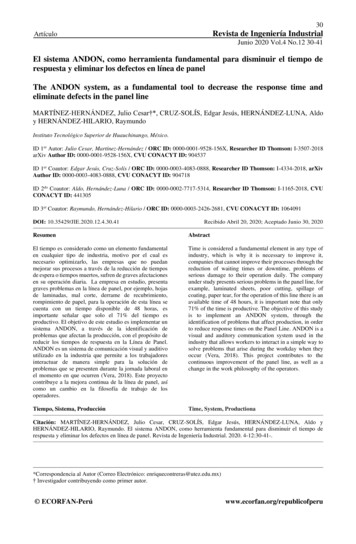
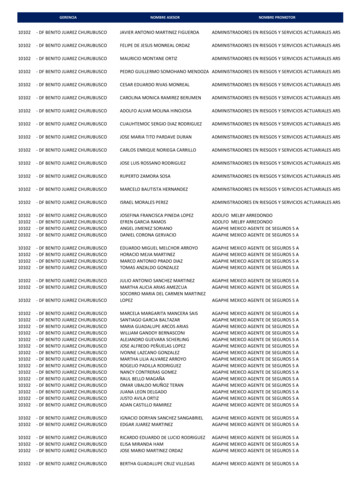
![The Book of the Damned, by Charles Fort, [1919], at sacred .](/img/24/book-of-the-damned.jpg)
